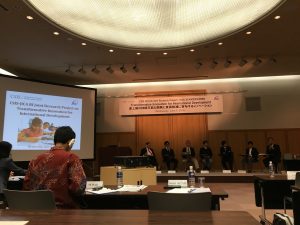Hi all , this is Vicka, first year Ph.D. student in Abe-lab.
On June 8, 2016, I was attending a public seminar “CSIS-JICA RI joint research project on transformative innovation for sustainable development and poverty reduction: Innovation Ecosystems and Smart Cities” which was held by JICA Research Institute and The Center for Strategic and International Studies (CSIS) which included panel report presentation, comments to the report, and facilitated a question and answer session with the audience.
The first session opened by the President of JICA, Mr. Shinichi Kitaoka and followed by a presentation of platinum society network especially in Japan by Mr. Hiroshi Komiyama, Chairman of Mitsubishi Research Institute, Inc). Next, the panel members from CSIS, Jakarta smart city management project member, and Professor from Asia University and Keio University. All the panel presentations in the first session, which was led by Mr. Kitano was very interesting, especially about Smart city project in Jakarta, Indonesia, which was implemented by the government of Jakarta since 2014 and focuses on collecting big data and analyzing it to drive the city’s decision making, accountable governance and improve services delivery to the citizen by utilizing platform and social network where people encouraged to participate and contribute in the city’s development.
In my opinion, the implementation of the smart city project in Jakarta is a good step to make a better Jakarta especially to solve and managing congestion, build new MRT, preventing Jakarta from annual flood disaster, increase the number of public spaces, improve the government service by becoming more accessible and transparent for the citizen, since the level of corruption still remains high. Even though so many programs included in Jakarta smart city project, I was wondering about the management and improvement urban slum in Jakarta through smart city program because the slum is one of the most densely populated in Jakarta and the number of the slum in Jakarta is quite high. In addition, the situation in the slum is not so good especially for the water and sanitation. The representative from the Jakarta smart city project, Mr. Setiaji explained that the government also concerned about urban slum by trying to relocate the dwellers in the slum area to the new area, which has better infrastructure and access to the clean water. But, this action still needs big effort and perhaps the implementation of smart city can touch that element also. During the session, the other audience in the discussion also asking about the sustainability of Jakarta smart city project, “will the project can be continued even though the leader in the government change”, because if the leader change there is a possibility to change the current project. That aspect is also interesting because to improve the city’s situation, especially Jakarta it needs the commitment from the leaders or the stakeholders.
Following the breaks, the second session was begun and delivered in Japanese. This session was about the innovation ecosystem in Bohol, Philippines. The panel members in this session were from CSIS representative, JICA representatives, Professor from Keio University, Kyusyu University, Fab.Lab Foundation Board Member, Center for Global Communication International University of Japan (GLOCOM).
This is the first time for me to hear about Fab lab (Fabrication Lab) with the utilization of 3D printer, and I found it is very interesting. During the session it was explained, the reason behind why this project is implemented in Bohol, Philippines, first is because lower Human Development Index (HDI) in Bohol is 0.482 compared to an average HDI of 0.609 across the Philippines, and second is because the location of Bohol is quite isolated and far, so the transportation cost of the goods also high and the number of investment in Bohol also is quite low. Regarding those issues, the Fab Lab project in Bohol hopefully can improve the productivity and competitiveness of small medium enterprise in Bohol, and boost the local economy. The products that already produced in Bohol Fab Lab. such as affordable prosthetic leg by using 3-D printer, chair from plastic waste, up-cycle the bag, robot, etc.
Second session: The innovation ecosystem in Bohol, Philippines
In my perspective, this kind of project was very useful yet challenging, especially for the city in developing country. Not only increase the innovation idea from the local community but also can enhance and stimulate the appropriate technology’s innovation, which can easily implement and improve the quality of life of the local community. In addition, the most important things to make the innovation ecosystem such as Fab lab remain to sustain are the accessibility of financial resources and guidance for the start-up, the spillover effect also need clear measurement.
In general, this seminar gave me some knowledge and a new perspective of the utilization of innovation and creating ecosystem innovation to help and improve the well – being of the people who live in an area especially for the people who suffer under poverty. As the academician we should consider those kinds of things and try to seek the proper approach to solve the problems in the city, so our research can useful for the society and make a positive change.
(By VK)
